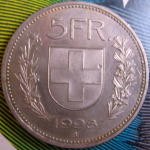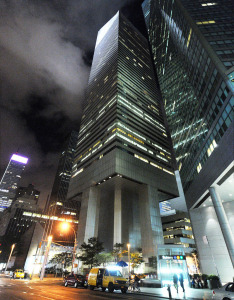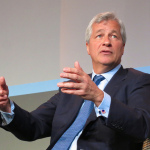By Alex Plough January 16, 2015
Swiss Franc Surprise

Swiss Franc.
© Sterling Ely/Flickr
The Swiss National Bank surprised investors on Thursday by dropping a three-and-half-year policy that capped its currency’s exchange at 1.20 franc per euro.
The Swiss franc immediately surged in value 20% against the Euro, which drove a 10% drop in Swiss stocks, given that the country’s exports suddenly become more expensive for its trading partners.
Only days earlier, SNB officials described the currency peg as a cornerstone of its monetary policy. It was introduced in September 2011 to stem a rise in the currency caused by a rush of investors exchanging Euros for Swiss Francs as a safe haven from Eurozone volatility.

Davos, Switzerland.
© World Economic Forum/Flickr
The country’s export-led economy suffered from an overvalued franc, and over the years the central bank has been forced to buy up vast quantities of euros to defend its policy of an imposed SFr1.20 exchange rate floor against the euro.
The move came a week before the European Central Bank is expected to unveil a massive bond-buying program, which might have forced the SNB to intervene repeatedly to defend the cap. The companies most negatively effected by a rapidly appreciating franc include major Swiss exporters such as the watchmaker Swatch and Richemont, which owns the luxury firm Cartier. Both company’s share prices were down roughly 15 percent on Thursday.
The inflated Swiss Franc will likely take its toll on global policy makers when they convene at the upcoming World Economic Forum in the Swiss resort of Davos. According to Bloomberg, a bottle of Johnnie Walker Blue at the popular Belvedere Hotel will now set you back the equivalent of $41 for the 36-franc whisky, about $6 more than you would have spent on the nightcap yesterday.
US Banking Profit Fall
It has been a tough week on Wall St. for major US banks, which released depressed earning reports for the fourth quarter of 2014. Earnings took a hit in part from rising legal costs and tighter regulatory controls, according to the banks.

Citigroup Center, Midtown Manhattan, New York.
JP Morgan CEO Jamie Dimon
© Steven Severinghaus/Flickr
On Thursday Citigroup said that profits fell by more than 86% year on year to reach $350 million, or 6 cents a share, compared to $2.5 billion, or 77 cents a share, in the Q4 2013. The firm pointed the finger at large legal charges stemming from expensive settlements to end government investigations into its currency trading business.
These charges also included the estimated expense of a separate investigation into the role played by Citigroup and other banks in the suspected manipulation of the benchmark London interbank offered rate, or Libor. Another drag on earnings was the rise in value of the dollar, which hurt the bank’s overseas revenue.
Earlier in the week Citigroup announced it was scaling back its consumer banking presence from markets where it does not have enough branches to be competitive.
The biggest US bank JPMorgan Chase & Co, revealed on Wednesday that its fourth-quarter profit fell 6.6% on the back of a 23% drop in fixed-income trading revenue and legal costs that were about twice as high as some analysts had estimated.
Net income for the quarter fell to $4.93 billion, or $1.19 a share, from $5.28 billion, or $1.30, a year earlier. In October 2014, the bank sold its physical commodities business to Mercuria Energy Group Ltd for $3.5 billion in cash, a move which lowered its quarterly fixed-income trading revenue to $2.5 billion.
But the biggest surprise was a previously undisclosed $990 million after-tax legal expense related to the bank’s foreign exchange trading, the latest in a long line of legal headaches for the world’s largest investment bank.

Jamie Dimon, CEO of JP Morgan Chase, at the JP Morgan Healthcare Conference, January 2013. © Steve Jurvetson/Flickr
Chief Executive Officer Jamie Dimon, 58, expressed his frustration with the world’s regulators in profanity-laced conference call on Wednesday.
About regulatory sanctions, which range from criminal inquiries into foreign exchange trading and the bank’s sale of mortgage backed securities, to regulatory probes into large trading losses, interest rate manipulation and the firm’s compliance with the Foreign Corrupt Practices Act, Dimon said he believes the firm is acknowledging its mistakes, resolving liabilities, and careful to “stop stepping in dog ****, which we do every now and then.”
Meanwhile Bank of America, the second-largest US bank by assets, posted a 14% fall in profits. Net income fell to $2.74 billion, or 25 cents per share, in the fourth quarter from $3.18 billion, or 29 cents per share, a year earlier. The performance of its core businesses like trading and mortgage banking have struggled with tepid global growth and an uneven recovery in the US housing market.
Eccentric Billonaires

Donald Trump, at CPAC 2011. © Gage Skidmore
/Flickr
Two of America’s most iconic businessmen, the property tycoon Donald Trump and the fund manger Bill Gross, have been settling their scores in public in recent weeks.
The Associated Press reported that the publicity hungry Trump is suing Palm Beach County for $100 million in a suit that claims air traffic is purposely being redirected over his Mar-a-Lago estate in south Florida.
He claims that the county’s airports director convinced the Federal Aviation Administration to re-route air traffic in a “deliberate and malicious” action to anger the property tycoon.
Bill Gross on the other hand, is set to give the media his side of the story about his very public departure last year from the Pacific Investment Management Company (PIMCO), which he co-founded in 1971. According to a Bloomberg article teasing an upcoming radio interview with Bloomberg View’s Barry Ritholtz, which airs on Jan. 17, Gross has confirmed for the first time that he was fired from the firm. Gross tells Ritholtz that “he offered to step down from the executive committee and compensation committee and oversee closed-end funds after differences with management over his personality and the firm’s business direction.” But they fired him instead.
****
Alex Plough is a freelance business journalist based in New York. Originally from London, England, he has a background in data-driven investigative reporting and has worked on a number of agenda-setting projects such as the award winning Iraq War Logs for the Bureau of Investigative Journalism. More recently he graduated from Columbia Journalism School’s masters program, business and economics reporting concentration, as well as Columbia’s Lede Program – a three month course designed to apply the tools of computer science to journalism. He is particularly interested in the overlapping fields of finance, technology and how young people are shaping the new American economy.
This entry was posted on Friday, January 16th, 2015 at 4:50 pm. It is filed under Week in Review and tagged with Bank of America, Bill Gross, Cartier, Citigroup, Donald Trump, J.P. Morgan, Jamie Dimon, Richemont, Swatch. You can follow any responses to this entry through the RSS 2.0 feed.
Comments are closed.
